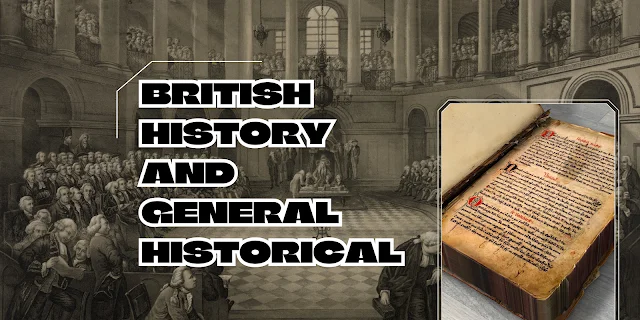Introduction:
In the vast panorama of human experience, few narratives are as rich and influential as the intertwined tales of British history and the broader expanse of general historical events. History, as a discipline, serves as our collective memory, and within it, the story of Britain unfolds as a fascinating and integral chapter. In this exploration, we embark on a journey through time, delving into the key epochs of British history while also contextualizing them within the broader sweep of global events.
1. British History: An Overview:
At the heart of our exploration is a comprehensive understanding of British history. The keyword British history serves as our guiding thread through the annals of time, from the ancient Celts to the modern United Kingdom. We will unravel the complexities, triumphs, and challenges that have shaped the destiny of this island nation.
2. Ancient Britain:
The tale of British history begins in antiquity, with the Celts and the Romans leaving indelible imprints on the landscape. The keyword British history intertwines with the narratives of tribal societies, Roman conquests, and the enduring legacies that continue to define the British Isles today.
3. Medieval England:
As we traverse through medieval times, the keyword British history remains ever-present. The Norman Conquest, the Plantagenet dynasty, and the Wars of the Roses shape the contours of medieval England. The story of knights, castles, and courtly love becomes a part of the larger tapestry of global medieval history.
4. Tudors and Stuarts:
The Tudor and Stuart periods mark a pivotal epoch in British history. The keyword British history is interwoven with the tumultuous reigns of Henry VIII, Elizabeth I, and the Stuart monarchs. The Renaissance, the Reformation, and the exploration of the New World add layers to the multifaceted story.
5. The Age of Enlightenment:
The Age of Enlightenment, with its intellectual fervor and scientific advancements, casts a luminous glow on British history. The keyword British history resonates as we delve into the contributions of thinkers like John Locke and the societal transformations that laid the groundwork for modernity.
6. Industrial Revolution:
The 18th and 19th centuries usher in the Industrial Revolution, a transformative era in British history. The keyword British history is prominent as we witness the mechanization of industry, urbanization, and the social upheavals that accompany this period. The impacts of these changes reverberate far beyond the British Isles.
7. British Empire:
No exploration of British history is complete without an examination of the British Empire. The keyword British history takes center stage as we navigate through the imperial expansion, colonial rule, and the complex legacies that shape geopolitical dynamics to this day.
8. World Wars:
The 20th century witnesses the crucible of two world wars that reshape the global order. The keyword British history echoes through the trenches of World War I, the Blitz of World War II, and the subsequent rebuilding efforts. The sacrifices and resilience of the British people become integral to the broader historical narrative.
9. Post-War Era to Present:
In the post-war era, the keyword British history continues to guide us through the challenges and triumphs of reconstruction, the dismantling of the empire, and the complexities of the modern era. The story unfolds against the backdrop of a changing world order and the evolving role of Britain on the global stage.
10. General Historical Perspectives:
As we weave the threads of British history, it is essential to step back and examine the broader canvas of general historical perspectives. The keyword history becomes a universal lens through which we view the interconnectedness of civilizations, the crosscurrents of ideas, and the shared human experiences that transcend borders.
Contextualizing British History in the Global Narrative:
The story of British history is not an isolated narrative; it is intricately linked with the general historical tapestry of humanity. The rise and fall of empires, the exchange of ideas along the Silk Road, and the impact of scientific discoveries all contribute to the broader context in which British history unfolds.
Historical Turning Points:
In both British history and the general historical narrative, certain turning points stand out as transformative moments. From the signing of the Magna Carta to the fall of the Berlin Wall, the keyword history signifies these pivotal moments that shape the destinies of nations and reshape the course of human affairs.
Cultural and Intellectual Contributions:
The cultural and intellectual contributions emanating from British history reverberate globally. From the literary masterpieces of Shakespeare to the scientific breakthroughs of Newton, the keyword British history underscores the enduring impact of British achievements on the broader spectrum of human knowledge and creativity.
Legacy and Lessons:
As we reflect on British history and general historical trends, the keyword history compels us to consider the legacy and lessons that this collective past imparts. The struggles for freedom, the advancements in technology, and the resilience of societies in the face of challenges offer valuable insights for the present and future.
Conclusion:
In conclusion, the exploration of British history is not a solitary endeavor; it is a journey intertwined with the broader currents of human history. The keyword British history serves as a guide through epochs and events, connecting the local narratives of the British Isles with the universal tale of humanity. As we unravel the tapestry of time, it is evident that the threads of British history are inseparable from the intricate weave of global historical forces. In understanding these interconnected stories, we gain a deeper appreciation for the complexities, continuities, and shared experiences that define our collective past and shape the path forward.






